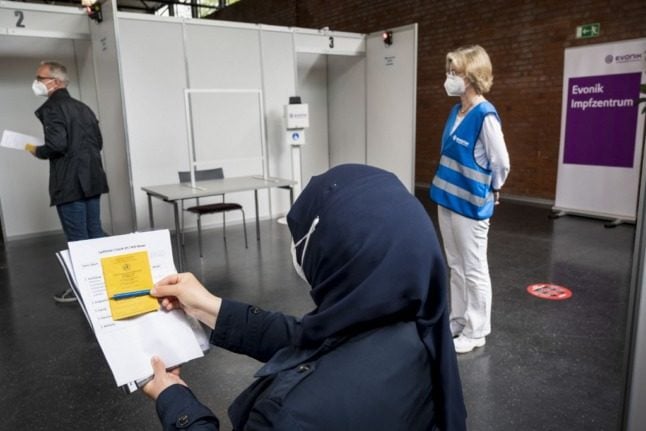He’s here to get a Covid-19 jab, as his German employer Evonik Industries joins a push to ramp up the country’s immunisation drive by including company doctors in the effort.
“You can get vaccinated without hardly any waiting time, it’s great,” Scharf, 58, told AFP after making the short walk from his work station to the dining area.
The usual tables have been removed to make way for rows of small booths manned by medical staff.
Each section is dedicated to a different step in the process, from signing consent forms and getting a pre-jab consultation to the actual injection and recovery room.
Hungry workers can still grab food-to-go in an adjacent room.
The makeshift vaccination centre at chemicals group Evonik’s Hanau site, near Frankfurt, is one of several such pilot projects in Germany. Rail
operator Deutsche Bahn, carmaker Volkswagen and chemicals giant BASF have launched similar schemes.
The official starting shot for company doctors nationwide to join the coronavirus jabs campaign will come on June 7.
Demand is expected to outstrip supply, at least at first, until larger vaccine shipments gradually find their way into Germany’s mass vaccination centres, doctor’s practices and participating companies.
After a much-criticised slow start, Germany has significantly picked up the inoculation pace in recent weeks.
Some 40 percent of adults have now had their first shot and more than 13 percent have had both jabs.
READ ALSO: Couple in southern Germany accused of forging Covid vaccination certificates
READ ALSO: Why are some parts of Germany still not vaccinating people in their 60s?
‘Light on horizon’
At Evonik, company doctor Christine Busch only has a few hundred doses to administer during the pilot phase.
But once the project kicks into high gear next month, she expects to vaccinate around a thousand people a week.
Initially the focus will be on Evonik’s roughly 3,500 Hanau-based staff and the employees of partner companies. There are also plans to eventually extend the offer to employees’ family members.
All the jabs in the pilot scheme are Pfizer/BioNTech shots, for which Evonik happens to produce the tiny bubbles of fat known as lipid nanoparticles that protect the vaccine’s crucial mRNA molecules.
As long as vaccine supply is still tight, her firm is prioritising staffers who have to be on site and can’t work from home.
“We’ve all been living with this pandemic for over a year,” Busch said.
“Now for the first time we can see light on the horizon and actively play a part in beating this thing. That’s pretty special.”
And according to Hanau site manager Kerstin Oberhaus, there’s no shortage of appetite for the jabs.
“As soon as I get out of my car in the morning, people come up to me asking when it’ll be their turn,” she said. “The eagerness to get vaccinated is huge.”



 Please whitelist us to continue reading.
Please whitelist us to continue reading.
Member comments